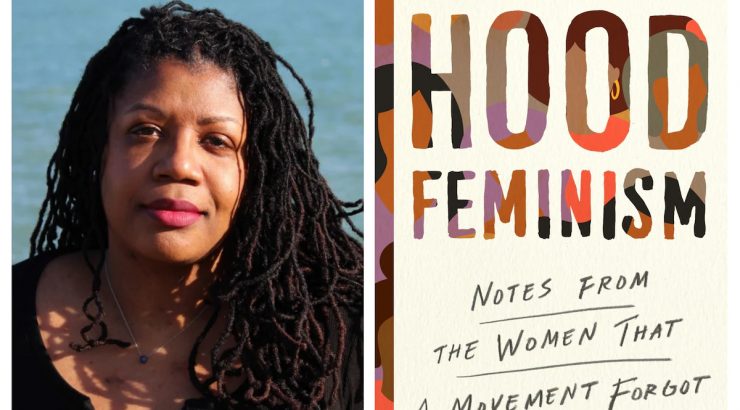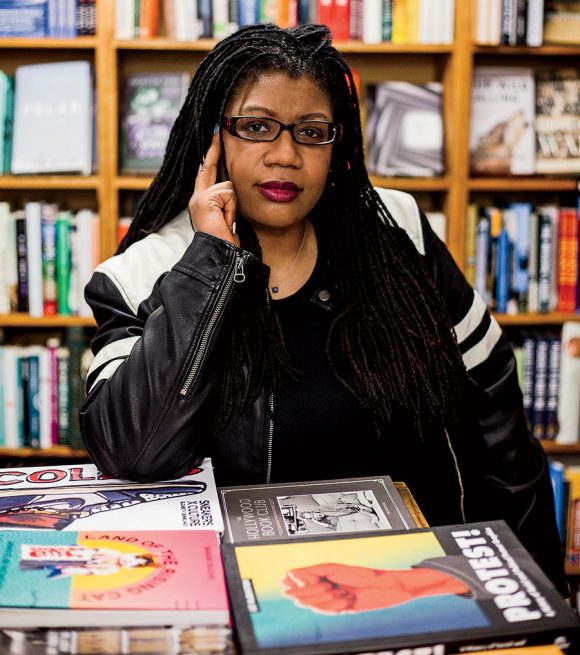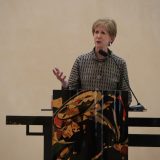
Commemorating Black History Month Sisters Circle
February 27, 2023
Thanks to the efforts of Dr. Angelica Allen, Director of Wilkinson College’s Africana Studies minor, this month’s Sisters Circle commemorated Black History Month by centering on the perspectives and contributions made by Black women toward feminist movements. She partnered with Misty Levingston, Chapman’s Director of Black Excellence and Achievement in the Office of Diversity, Equity, and Inclusion (DEI) to run the two-part campus conversation on Mikki Kendall’s Hood Feminism: Notes From the Women That A Movement Forgot.
“I chose this text as a response to mainstream feminism’s tendency to leave out those who exist in the margins. I believe that this is a great introductory text to understanding what feminism is and what it isn’t. While feminism claims to be for all women, it often fails to take into consideration poor people’s lives. Although I’ve assigned the text to my Black Feminisms course, I really wanted students who were not enrolled in my class to have access to this book and to be able to talk about it outside of the more formal classroom space.”
Sisters Circle (alongside Brothers Real Talk) is one of the Office of DEI’s newer initiatives to create intentional community spaces for Black students, and is open to the entire Chapman community. The group meets bi-weekly to allow students to share their experiences as women of color, allowing it to be the ideal space on campus to host this nuanced discussion about critiques of mainstream feminism.
Bernadine Cortina, a junior majoring in English Literature and minoring in Africana Studies, Ethnic Studies, and Women’s & Gender Studies, spoke about her motivation to attend both Sisters Circle sessions. “I was really drawn to attend this discussion because I had never heard of Hood Feminism before, and I wanted to learn more! I also thought that a community space like this one is such a gift. It was a real joy to be able to sit and laugh, share and learn honestly with others about our lived experiences, identities, and feminisms.”
“The Sister Circle is an intentional gathering created for students to be their authentic selves,” said Levingston, “…and share their thoughts in a non-judgmental space. Reading Hood Feminism as a collective group lets students reflect on how the book is applicable to their own experiences, and how the book is applicable to historical and current social contexts… hearing others share allows us to hear different perspectives on the issue.”
Dr. Allen started the first session on February 7th by explaining that Hood Feminism is rooted in lived experiences outside academic spaces. More specifically, Kendall brings the material conditions of poor, Black people’s lives to the forefront of feminist discussions on equity. By doing so, it becomes immediately apparent that when feminists shift their focus from one set of issues to another, priorities also shift.
It was not long before students began to point toward the U.S. women’s suffrage movement as an example of exclusionary mainstream feminism. While many believe that the 19th amendment guaranteed all women the right to vote, state-level discriminatory laws prevented many women of color from voting the passage of the Voting Rights Act in 1965. To students, this emphasized the importance of building solidarity within feminist movements.
The group reconnected on February 21st to continue their discussion. Students and faculty took turns sharing which text sections were most impactful for them. Among the most cited pertained to Kendall’s emphasis on viewing a broader range of problems, like poverty and gun violence, as feminist issues. “What is feminism if it doesn’t speak to oppression?” asked CK Magliola, Director of Wilkinson’s Women’s & Gender Studies.
In discussing the meaning of feminism, some said it is a reclamation of power. Some added that feminism is about recognizing the excess labor women are often expected to perform, highlighting the importance of women sticking together despite personal feelings. All agreed that feminism relates to maleness and is not about putting men down.
“[I was surprised by] How open and willing students were to talk about their lived experiences in relation to the text. There was a genuine desire to learn about feminism and be in a community with one another. We had diverse groups of students who showed up to the book club meetings,” noted Dr. Allen at the conclusion of the discussions.
To learn more about the Africana Studies minor, please contact anallen@chapman.edu.
To learn more about Sisters Circle and Black Excellence and Achievement, contact levingston@chapman.edu.


